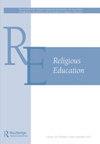不稳定中的(本体论)祖先和身体:宗教教育面对本体论恐怖、生物权力和死亡政治
IF 0.4
3区 哲学
0 RELIGION
引用次数: 0
摘要
对祖先的广泛理解对于宗教教育想象力空间的开放是不可或缺的——特别是在大学和成人信仰形成的环境中——以深刻地应对这种不稳定的环境和这种环境所滋生的绝望。更具体地说,这篇文章考虑了一个人过去的自我(“本体论的祖先”)和生活在不稳定中的肉体他人如何导致持续的同情和实践,以应对本体论的恐怖、生物权力和死亡政治。通过askēsis和根状身份形成等实践,不断地忘却和驱逐你的自我,这样的幽灵是可能的。一旦这些实践成为核心,宗教教育就可以培养对当前(无望的)现实和不稳定的身体体验的诚实参与和深切同情的可能性。本文章由计算机程序翻译,如有差异,请以英文原文为准。
Haunted by (Ontological) Ancestors and Bodies in Precarity: Religious Education Confronts Ontological Terror, Biopower, and Necropolitics
Abstract An expansive understanding of ancestors is integral to the opening of imaginative spaces for religious education—particularly in university and adult faith formation settings—to grapple deeply with contexts of precarity and the hopelessness such contexts breed. More specifically, this essay considers how hauntings by one’s past selves (“ontological ancestors”) and by enfleshed others living in precarity can lead to sustained compassion and praxis in response to ontological terror, biopower, and necropolitics. Such hauntings are possible through continual unlearning and dislodging of one’s very self through practices such as askēsis and rhizomatic identity formation. Once these practices become central, religious education can foster possibilities for honest engagements with and deep compassion for present (hopeless) realities and the experiences of bodies in precarity.
求助全文
通过发布文献求助,成功后即可免费获取论文全文。
去求助
来源期刊

RELIGIOUS EDUCATION
RELIGION-
CiteScore
0.90
自引率
28.60%
发文量
46
期刊介绍:
Religious Education, the journal of the Religious Education Association: An Association of Professors, Practitioners, and Researchers in Religious Education, offers an interfaith forum for exploring religious identity, formation, and education in faith communities, academic disciplines and institutions, and public life and the global community.
 求助内容:
求助内容: 应助结果提醒方式:
应助结果提醒方式:


